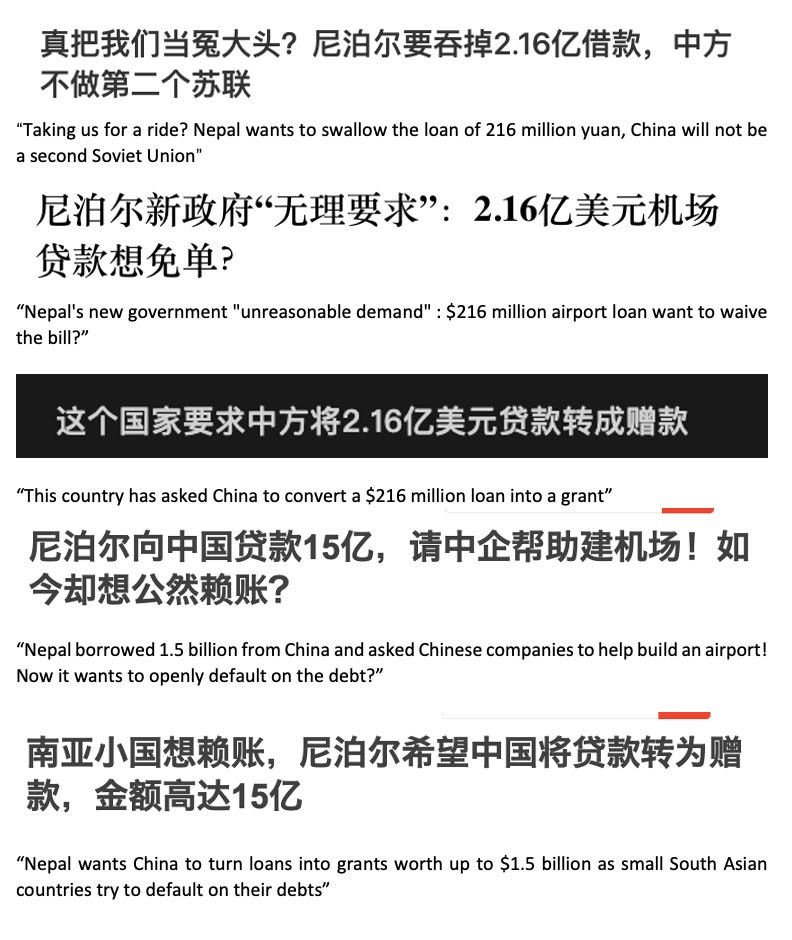
Context
The Araniko Project, over the years, has written articles stressing understanding Chinese public opinion as a tool to understand the sentiment of the Chinese government. In this article, we will not stress that part (readers can refer to our previous articles - link at the bottom) but focus on how recent Nepal’s proposal of debt forgiveness has stirred up Chinese internet public discourse on whether it should be accepted or not.
In recent times, we have seen recurring articles and events with Nepali political party leaders or government officials requesting China to convert loan of NRS 25.88 billion from China EXIM Bank into a grant. From China, the major statement came out last year on November 14, 2023, where the MOFA spokesperson Mao Ning stressed that Chinese companies “took full consideration to the local situation, followed the quality standards strictly during design and construction, and kept complete records”.
These, followed by international reporting by the New York Times on Pokhara Airport had sparked a lot of discussions and debates in the social media world. The most notable was a heated exchange between the Ambassador of China to Nepal Chen Song and a senior journalist Gajendra Budhathoki further fueled the speculation regarding the airport.
In that regard, Chinese social media has been buzzing with their analysis of the matter of Pokhara airport. The Chinese public has taken to the internet to voice their opinion and analysis on the matter.
While there’s a general expression of frustration with Nepal’s political instability, Nepal’s proposal has been set as a reminder for cautious China’s aid policy.
厚往薄来"Give generously, receive little"
Using historical analogies as a source of legitimacy is a hallmark of Chinese diplomacy. In most cases, we found netizens using example of Ming dynasty emperors Zhu Yuanzhang and Zhu Di who were eager to showcase China’s dominance through extensive tribute relations. However, the system became costly because of 厚往薄来 (Hòu wǎng báo lái) where China compensated tributary countries well above market value for their tribute goods along with lavish hospitality.
This is in direct reference to Chinese assistance to Nepal throughout the 1960s1 where some netizens argue that despite China’s weak foundation and economic policies, it still assisted Nepal in infrastructure projects. Many netizens sees Nepal’s unwillingness to pay back as offensive and see Nepal’s approach as being “unfriendly” to China.
Some see it as part of larger geo-politics. One netizen’s comment:
“ If China agrees, it will reduce the economic burden on Nepal and continue to maintain this delicate balance between China and India. However, in the other case, Nepal may side with India and continue to play its balancing game”.
Each opinion piece credits China for its dedicated efforts to diminish Nepal’s dependence on India in terms of trade while also portraying Nepal as ultimate and helpless victim of its geography2.
Nostalgia of Soviet Union aid
Another stack of opinion is that Nepal’s request for debt relief has made Chinese netizens nostalgic about Soviet Union’s foreign aid policy3. According to them, despite providing grants and aid to win allies and support for Soviet Union, the results became disastorous to the point of economic collapse and disintegration, causing many allies to abandon it and loose influence.
Using this analogy, some opinions state the obvious consequence of forgiving debt that would result in similar demands from other countries and eventually burden China as consequence of “giving generously”. Many suggest their government to not be easy with negotiations or provide the most baseline reason for other countries being unvirtuous in not paying back borrowed money and instead ask for it as a gift.
Some also tried to draw connection of the timing in which the TikTok ban in Nepal was lifted right on time when Nepal’s proposal and that Nepal hoped to use it as a bargaining chip.
In conclusion, given the Chinese public opinion’s disapproval towards Nepal in trying to find ways to justify their loan forgiveness proposal, it seems highly unlikely that the proposal would move forward anytime soon.
Bonus points from The Araniko Project
There have been some interesting Chinese words used to describe Nepal’s attitude and move towards this issue and China in this situation.
Some have used words like 冤大头(yuān dà tóu)to describe China which refers to a person deceived on account of their generosity. Nepal has been also referred to as 老赖(Lǎo lài)which refers to people legally in debt or a deadbeat
Some references in understanding Chinese public opinion on Nepal
वाङ यीको नेपाल भ्रमणपूर्व ‘आश्चर्यजनक’ चिनियाँ मौनता
चिनियाँ ‘नेटिजन्स’ को नेपाल-दृष्टि
https://www.163.com/dy/article/JBQKTM130511F2MA.html
https://www.163.com/dy/article/JBLGV3VE0532IG7I.html
https://m.163.com/dy/article/JB92DT8G0543IBKA.html




Nepali politics has played havoc with allies. The sole focus of all appears to be garnering cheap popularity for votes with the least concern about the future of the nation.